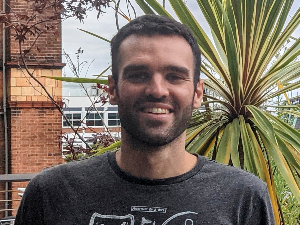Originally from Italy, Federico completed his PhD in Biomedical Sciences at the Masaryk University in Brno, Czech Republic, before joining The Institute of Cancer Research in September 2021.

How did you find moving to the UK?
Moving to the UK was generally quite easy and the ICR helped me a lot – especially with sponsoring me to come to the UK. Only some institutions can provide this support. I received full financial support from the ICR – they paid for my visa, for example, and the required health surcharge for the NHS.
The recruitment managers were also very helpful and responsive from the very beginning, so I managed to get everything I needed – I asked and I received!
What is it like working in Chelsea?
Working in Chelsea is great and there’s a very good community here. We’re very central, so it’s easy to reach from almost everywhere in London. The core facilities are very solid and have lots of capabilities. There are many other research groups based in Chelsea and this makes especially easy to have scientific discussions and build your network. All the Principal Investigators here are very helpful and happy to provide feedback.
The social events are also great – on Friday afternoon we have a forum called Science Bites and after the seminar we gather with other groups sharing ideas and talking science. There’s also the PostDoc Association, which helps us to navigate the organisation, for example by finding other postdoc contacts. The association also promotes other events in and outside the ICR, which I always try to participate in.
It is fun to work here! I was happy to discover that there are many postdocs, which I wasn’t expecting. Often in Higher Education research institutions there can be an imbalance with more students and fewer specialist scientists, but that isn’t the case at the ICR – you can find people who have experience and you can always ask for advice and guidance. It’s very easy to connect with other people.
How do you find London life?
I really like London. When I came to the ICR it was the first time I had been to the city, so it was all new to me. I really like the fact that you can be close in your neighbourhood – you usually expect from a metropolis that there will be huge buildings everywhere, but you see that there are plenty of smaller flats so it’s easy to find your own secluded area, yet still be close to the bustle of the city. London is a very multidimensional city and I really enjoy this aspect of it.
Where do you want to go in the future?
I’m still figuring out what I want to do in the future, but this postdoc is definitely helping me decide the route I will take in my career in the future. Here at the ICR you can be a postdoc for up to seven years in total, but there are also other avenues from where you can join or stay in the organisation, such as taking a scientific officer position.
The good thing about the ICR is that it opens up multiple doors. There’s a broad catalogue of training resources tailored for each career stage, ranging from technical courses in microscopy imaging and bioinformatics analyses to career and professional development. This way, I can learn transferable skills that will be very useful if I choose to move to a different sector, but I also have the experience of the core science if I stay in academia after the postdoc.